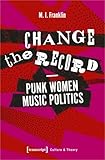Change the Record - Punk Women Music Politics / M.I. Franklin.
Material type: TextSeries: Edition Kulturwissenschaft ; 165Publisher: Bielefeld : transcript Verlag, [2024]Copyright date: 2024Description: 1 online resource (154 p.)Content type:
TextSeries: Edition Kulturwissenschaft ; 165Publisher: Bielefeld : transcript Verlag, [2024]Copyright date: 2024Description: 1 online resource (154 p.)Content type: - 9783837641714
- 9783839441718
- Punk culture -- Political aspects
- Punk rock music -- Political aspects
- Women punk rock musicians
- Cultural Studies
- Gender Studies
- Gender
- International Relations
- Music
- Performance Art
- Pop Music
- Popular Culture
- Riot Grrrls
- World Politics
- SOCIAL SCIENCE / Popular Culture
- Cultural Studies
- Gender Studies
- Gender
- International Relations
- Music
- Performance Art
- Pop Music
- Popular Culture
- Riot Grrrls
- World Politics
- online - DeGruyter
| Item type | Current library | Call number | URL | Status | Notes | Barcode | |
|---|---|---|---|---|---|---|---|
 eBook
eBook
|
Biblioteca "Angelicum" Pont. Univ. S.Tommaso d'Aquino Nuvola online | online - DeGruyter (Browse shelf(Opens below)) | Online access | Not for loan (Accesso limitato) | Accesso per gli utenti autorizzati / Access for authorized users | (dgr)9783839441718 |
Frontmatter -- Table of Contents -- LIST OF FIGURES -- ACKNOWLEDGEMENTS -- 1. INTRO -- To the Front -- Beyond Fanstalgia -- What Makes Punk Music (Not)? -- Reader Notes -- Which Books and Why -- Chapter Outline -- Setting Out -- 2. MUSICIANS AS MEMOIRISTS -- Punk Performance Sexual Politics -- Punk Public Archives -- The Memoirs: ‘Dear Reader’ -- Outro: Punk as Art -- 3. FINDING VOICE -- Intro -- Into the Voice -- Punking up the Pop Rock Canon -- Rebel Rebel -- 4. GRRRLS WITH GUITARS -- Intro -- Guitars Guitars Guitars -- Bodies Bodies Bodies: Woman with Guitar -- Punk Musica Practica -- Outro -- 5. VANGUARD OR OLD GUARD? -- Hip Priestess: Coat, Skirt, Hair, Hat -- ’Punk and Poses‘ -- Race-Gender-Class Horizons -- Since – On Getting Younger -- Nina Simone – She Who Did It First -- 6. OUTRO -- Sex, Gender and Public Culture -- How Did We Get Here? -- Listening to Music Writing -- Punk and Current Events -- Fade Up -- APPENDIX: THE MEMOIR-SET -- BIBLIOGRAPHY -- NOTES
restricted access online access with authorization star
http://purl.org/coar/access_right/c_16ec
Poets, Guitarists, Songwriters, TV Stars, Provocateurs, Riot Grrrl founders: the authors in this study challenge perceptions of punk music and politics. Viv Albertine, Alice Bag, Pauline Black, Carrie Brownstein, Kim Gordon, Nina Hagen, Chrissie Hynde, Patti Smith, Brix Smith Start, and Cosey Fanni Tutti have been breaking new ground in writing about their lives. They fill gaps in the historical record, back catalogues and perceptions of how music works as politics. They provide fans and music scholars with a corrective to androcentric studies of punk as a DIY politics of resistance to the mainstream. M.I. Franklin shows how they do this, along with ways to hear the personal and world politics inherent in their musical output.
Mode of access: Internet via World Wide Web.
In English.
Description based on online resource; title from PDF title page (publisher's Web site, viewed 20. Nov 2024)


